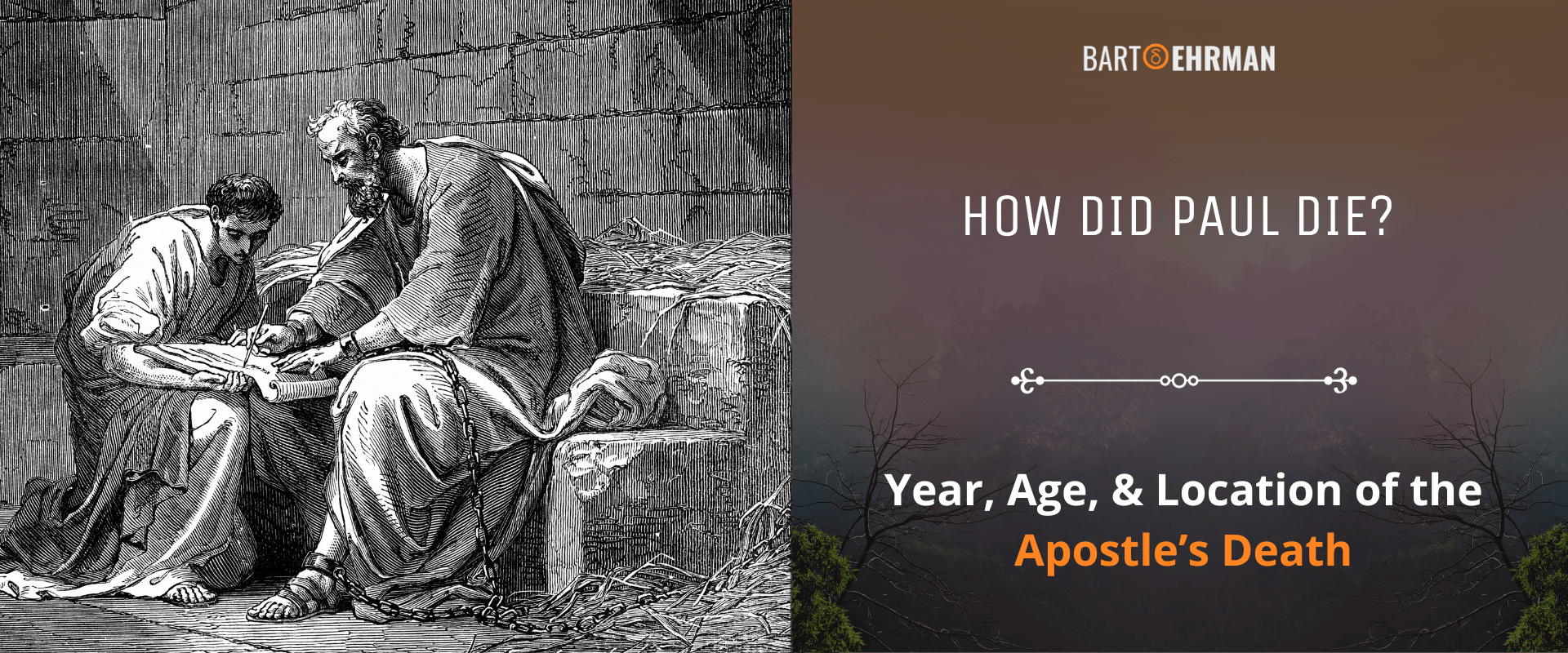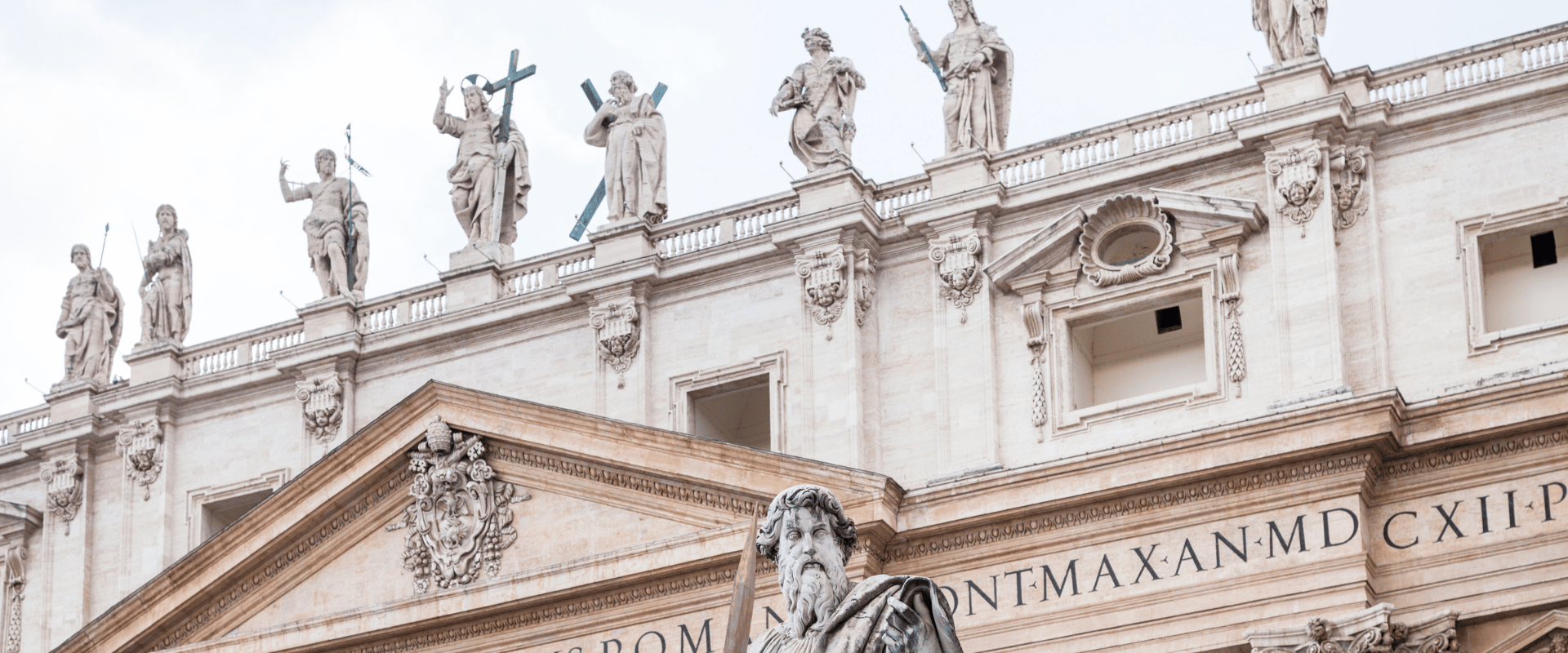How Did Paul Die? Year, Age, & Location of the Apostle’s Death

Written by Joshua Schachterle, Ph.D
Author | Professor | Scholar
Author | Professor | BE Contributor
Verified! See our editorial guidelines
Verified! See our guidelines
Edited by Laura Robinson, Ph.D.
Date written: November 10th, 2023
Disclaimer: The views and opinions expressed in this article belong to the author and do not necessarily match my own. - Dr. Bart D. Ehrman
Although so much of the New Testament was either written by or about the Apostle Paul, there’s one question that’s never answered there: How did Paul die? In this article, I’ll address this question, including the year Paul died, how old Paul was when he died, and where he died.

Who Was the Apostle Paul? A Brief Summary of His Life
We know very little about the early life of Paul. Paul, whose Hebrew name was Saul, may have been born around the year 5 CE, if he was a rough contemporary of Jesus – though of course he could have been younger or older. The Book of Acts says that Paul was from Tarsus, which means he was a Jew born and raised outside Palestine in Cilicia, a small region in modern-day Turkey. As a diaspora Jew, Paul learned Greek as his first language, although he learned Hebrew as well.
In his letters, Paul also tells us that he was a Pharisee. Pharisees, the forerunners of rabbinic Judaism, studied and interpreted the Torah meticulously and strove to live following its teachings.
In his own words, Paul “advanced in Judaism beyond many among my people of the same age, for I was far more zealous for the traditions of my ancestors.” In other words, Paul was a devoutly religious Jew.
As such, he initially saw the followers of Jesus as heretics. Paul writes that he “was violently persecuting the church of God and was trying to destroy it.” But then something happened.
Paul’s Conversion (or Calling)
According to Acts, Paul was heading to Damascus to persecute Jesus-followers when he saw a blinding light which knocked him to the ground. Then he heard a disembodied voice saying “Saul, Saul, why are you persecuting me?” The voice identified itself as Jesus, who told Paul to go into Damascus and wait for instructions. This was the beginning of Paul’s mission.
This experience has long been called Paul’s conversion, in the belief that Paul abandoned Judaism at this point to follow Jesus. Most scholars don’t believe this anymore, believing instead that Paul remained a good Jew who simply thought Jesus was the Messiah. Many scholars have therefore called Paul’s experience a “calling” instead, not unlike the way that prophets were called by God in the Hebrew Bible.
Paul came to believe that God had designated him as an apostle of Jesus to gentiles. As such, he began a lifetime of missionary trips, forming gentile Jesus communities all over the Roman Empire and writing letters to them to solve problems and give them guidance.
These letters would ultimately form the basis for much of later Christian doctrine. Paul’s influence on the formation of Christianity is incalculable.
Given how much information about Paul is in the New Testament, why don’t we know more about his death?
Paul’s Arrest in Jerusalem
At the end of the book of Acts, Paul goes to Jerusalem, visiting the temple with several others. While there, Paul is recognized by some men in the temple, who cry out
Fellow Israelites, help! This is the man who is teaching everyone everywhere against our people, our law, and this place; more than that, he has actually brought Greeks into the temple and has defiled this holy place.
They seize Paul and plan to kill him, but Roman authorities hear the uproar and come to see what the problem is. They arrest Paul as the instigator and put him under guard.
Subsequently, Paul, claiming that he is a Roman citizen, demands to be tried officially in Rome. He is taken there and spends two years under house arrest. While there, however, he is allowed to preach to people who presumably visit him, since he couldn’t leave.
However, Acts ends without telling us anything about Paul’s death.
Did Paul Go to Rome?
The last of the letters we know that Paul wrote was probably the Epistle to the Romans. Scholars agree that he probably wrote this letter around the year 57 CE from a city called Corinth in modern-day Greece.
While Paul usually wrote letters only to Jesus communities he himself had started, Romans is a letter in which he introduces himself and his gospel to a community he had yet to meet.
He also wrote of his plans to visit the Roman community:
I desire, as I have for many years, to come to you when I go to Spain. For I do hope to see you on my journey and to be sent on by you, once I have enjoyed your company for a little while. At present, however, I am going to Jerusalem in a ministry to the saints, for Macedonia and Achaia were pleased to share their resources with the poor among the saints at Jerusalem.
On all his missionary journeys, Paul would take up collections for the original Jesus community in Jerusalem. While he planned to visit Rome in the future, he tells the Romans that he is next going to Jerusalem to deliver these donations. This agrees with the account in Acts.
While some details of Paul’s arrest in Acts may not have happened, it is at least plausible that he was arrested for some reason in Jerusalem and transported to Rome.
When Did Paul Die?
Despite Acts’ silence on the matter, we do have accounts of Paul’s death outside the New Testament. The earliest comes from the letter of 1 Clement, around the end of the first century:
After preaching both in the east and west, [Paul] gained the illustrious reputation due to his faith, having taught righteousness to the whole world, and come to the extreme limit of the west, and suffered martyrdom under the prefects. Thus was he removed from the world, and went into the holy place, having proved himself a striking example of patience.
From this letter, it sounds as if Paul actually made his journey to Spain, “the extreme limit of the west.” Was he released by the Roman authorities? We just don’t know.
However, while it also claims that Peter was killed in Rome, 1 Clement doesn’t say anything about how either Peter or Paul was killed.
A 4th-century Church historian named Eusebius claims to have more details, blaming both Paul and Peter’s deaths on the emperor Nero.
After [Nero] had made clear that he was indeed the foremost enemy of God among them, he was stirred up for the slaughter of the apostles. It is therefore recorded that Paul was beheaded in Rome itself and that Peter was likewise crucified under him.
Nero was the first emperor to persecute Christians. Why? In the year 64 CE, during Nero’s reign, a huge fire swept through Rome, killing many and destroying huge areas of the city. A rumor was started that Nero himself had set the fire in order to clear an area for a new palace.
A Roman historian named Tacitus tells us what happened next:
Therefore, to scotch the rumor, Nero substituted as culprits, and punished with the utmost refinements of cruelty, a class of people, loathed for their vices, whom the crowd styled Christians… First, then, the confessed members of the sect were arrested; next, on their disclosures, vast numbers were convicted…
He goes on to say that the convicted Christians were tortured and killed in horrible ways. Some, for example, were set on fire and used as lamps to light Nero’s garden. This persecution apparently went on for several years until Nero died in 68 CE.
Paul wrote to the Romans in the year 57 CE that he was about to go to Jerusalem. If he was indeed arrested and transported to Rome, he would likely have been in Rome during Nero’s persecution. If he had been preaching the gospel of Jesus while under house arrest, Roman soldiers would have instantly understood that Paul was a Christian and had him executed.
Therefore, Paul was likely martyred in Rome between 64 and 68 CE. If he was born in about 5 CE, he would have been in his 60s.

How Was Paul Killed?
In another article, I noted that Christian tradition says that Peter was killed in Rome by being crucified upside down. This makes sense because crucifixion was generally only used on slaves, disgraced soldiers, Christians, and foreigners. Peter, a Jewish Christian from Palestine, fit the bill. But what about Paul?
The traditions about Paul’s death, like Eusebius above, generally say that he was beheaded. While we can’t know for sure, this also makes sense. Remember that Paul was a Roman citizen. Roman citizens were almost never crucified. The preferred method of execution for them was decapitation.
Conclusion: How Did Paul Die?
Why was Paul killed? Paul was probably arrested in Jerusalem, perhaps for instigating some kind of unrest. Although we can’t be sure of all the details, he appears to have been transported to Rome by Roman soldiers and put under house arrest.
When did Paul die? Paul was in Rome at the time of Nero’s persecution of Christians. This started in 64 CE right after the Great Fire of Rome. Consequently, Paul was probably killed as part of that persecution between 64-68 CE.
How Did Paul Die? Since Paul was a Roman citizen, he would not have been executed by crucifixion like Peter. Instead, he was probably beheaded since that was the preferred method of capital punishment for Roman citizens.

